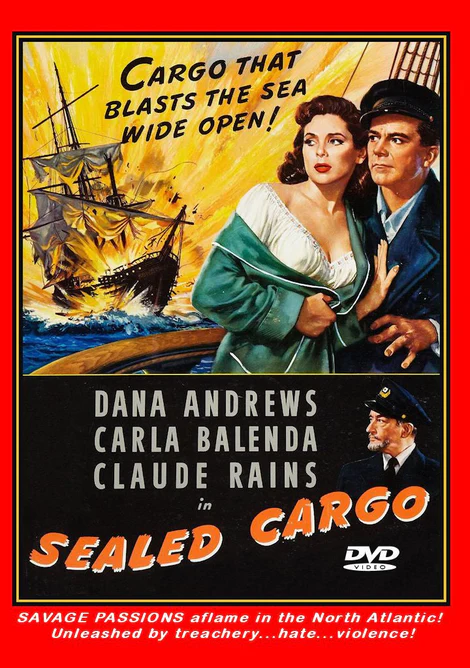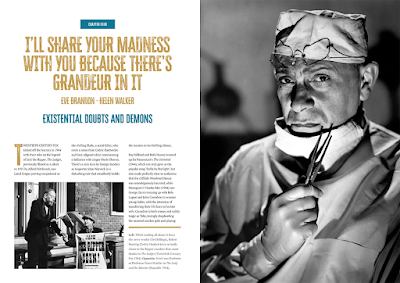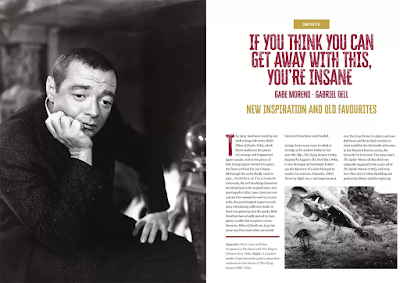MICHAEL F. HOUSEL has authored several novels for Airship 27 Productions, including THE HYDE SEED, MARK JUSTICE'S THE DEAD SHERIFF: PURITY & THE PERSONA TRILOGY, with his short stories appearing in THE PURPLE SCAR, THE PHANTOM DETECTIVE & RAVENWOOD, STEPSON OF MYSTERY. He is also a faithful contributor to Eighth Tower Publications' DARK FICTION series, various popular-culture periodicals and a frequent associate producer for MR. LOBO'S CINEMA INSOMNIA.
Tuesday, July 30, 2024
Friday, July 26, 2024
SO LONG, CARLA BALENDA (SALLY BLISS)
Whether by Carla Balenda or Sally Bliss, it all came out equal regarding your terrific talent.
You made a particular mark on adventurous cinema, but you weren't shy about dipping into noir and wholesome, family fare, either.
Your resume declare it all: Rustlers of the Badlands, Swing in the Saddle, Outlaw Women, Phantom Stallion, Prince of Pirates, Sealed Cargo, Seconds, The Whip Hand, The Pace That Thrills, Eadie Was a Lady, Dancing in Manhattan, Meet Miss Bobby Socks and Hunt the Man Down.
On television, you were even more industrious, with regular appearances on The Adventures of Fu Manchu, Lassie and The Mickey Rooney Show (Hey Mulligan), with guest shots on Wagon Train, The Rebel, The Gray Ghost, Perry Mason, 87th Precinct, The Real McCoys, The People's Choice, Date with the Angels and Men Into Space.
You were beautiful and sprightly, Ms. Balenda, cheerful and earnest: an all-around, perfect performer whose blissful body of work will continued to be enjoyed and revisited by your perennial fans.
Thursday, July 25, 2024
FAREWELL, YVONNE FURNEAUX
To Hammer fans, you hit the mark as both the stately Isobel Banning and the haunting Princess Ananka in Terence Fisher's Kharis retelling, The Mummy.
Your talents also enlivened other exotic features, including The Secret of Dr. Mabuse, The Champaign Murders, Repulsion, Cross Channel, Crossed Swords, The Lion of Thebes, The Dark Avenger, Charge of the Black Lancers, I am Semiramas, The Master of Ballantrae, The Prince with the Red Mask, The House of the Arrow, The Count of Monte Cristo 1961, The Beggar's Opera, Lisbon, La Dolce Vita, In the Name of the Italian People, Enough Rope, The One Man Jury (Il Criminale), Night Train to Milan, Meet Me Tonight, Run with the Devil, Temptation in the Summer Wind, Some Like It Cold, The Last of the Powerseekers and Frankenstein's Great-Aunt Tillie; plus, let's not overlook your television appearances on Danger Man, The Baron, The Adventures of the Scarlet Pimpernel, Hereward the Wake, The Man Who Never Was and Douglas Fairbanks Presents.
You held undeniable command and dexterity, Ms. Furneaux, no doubt perfected from your Shakespearean background, but you always captivated with your striking semblance. (Is it any wonder why Kharis sought you?)
May you now find peace in the afterlife, knowing that the impression you left on our lives will remain as eternal as the fabled women you portrayed.
I saw Deadpool & Wolverine's Terrific Team-up, Alternate Reality, Time Travel Time
Could Deadpool & Wolverine, a sequel to a movie mythology produced by Fox, be decrepit Disney's saving grace for a distilled MCU? You got me, but I (one who's been jaded by those ho-hum, let's-please-everyone-and-no-one, Carol Danvers chapters) believe this submission could do the trick, but then, how wrong could one go with Ryan Reynolds' Wade (Merc with a Mouth) Wilson and Hugh Jackman's alternate-Logan doin' their brazen thing?
The waters were tested many years ago with this X-Men crossover in Wolverine's first, solo sojourn, but Reynolds' Wilson wasn't the Deadpool he'd later become. For Deadpool & Wolverine, Wilson is in full, fourth-wall-breaking, crimson-clad mode, and Jackman's Wolverine is, well, as tough and grouchy as ever, even if a variant. The combination creates a pleasurable Spock/McCoy, argumentized contrast. (Incidentally, Logan's yellow-blue, comic-book outfit doesn't rub against Jackman's tall, lean grain, anymore than the "adorable" Dogpool diminishes his master's snarky stride.)
On the whole, this highly anticipated sequel, directed by Shawn (The Adam Project) Levy, who cowrote with Reynolds, Rhett Reece, Paul Wernick and Zeb Wells, is basic but profound in its implications.
Time Variance Authority chief, Matthew Macfayden's prissy, time-wrecking Mr. Paradox, wants to eliminate Deadpool's timeline (which is set to extinguish in about a couple centuries, anyway), though the eradication would be beyond merciless in its expedition. Though Paradox toys with Wilson to cloak the magnitude of his motive, Wilson sets forth to plug Paradox's plan, tracking down a disgruntled variant of Logan (said to have let his own universe tumble). This prompts our protagonists to jump through various, time-dimensional hoops to maintain the long-term dimensional stability. Along this arduous path, the two visit (and learn from) a number of the MCU's heroes and a few we never had the extended pleasure to meet. That means audiences get plenty of X-Men and Avenger cameos and even a series of surprise manifestations of Deadpool and Wolverine, characterized by diverse shapes and sizes. Wow!
To anchor the movie's mayhem, Deadpool & Wolverine makes no apologies for being profane, gruesome, explosion-laden and (most importantly) male-oriented: i.e., its leads are virile and act as most testosterone-propelled males would given the liberated chance within the plot's exaggerated circumstances. And they really have no choice but to do so, considering not only the crafty Paradox, but the diabolical Emma Corrin's Cassandra Nova, Professor X's rotten, sequestered sister. (That dear Cassandra resembles the guy-bashing/western-civ-despising Sinead O'Connor only accentuates to her bigoted treachery, except that Cassandra displays much more compassion than the defunct, Irish singer ever did. I mean, Cassandra's contempt is at least fictional.)
Deadpool & Wolverine is also a swell, throwback, buddy movie, much like the Lethal Weapon pictures. The banter is realistic, based on the personalities established, and the duo's reaction to others (whether friends, foes or fellow champions) feels right, like it's been there all along, just waiting to be plucked.
As I've mentioned in past posts, there is, indeed, an audience for this type of brass-necked storytelling, which goes way back to Marvel's classic (Golden/Silver Age) comics. Thank goodness, this one drives home Marvel's traditionalism, confirming that its tried-and-true formula (even if served with copious crassness and ultra-violent interludes) has always been the one-and-only way to go, and if it's not to be that way, then why the hell even bother?
Tuesday, July 23, 2024
HORROR MOVIES, AN ILLUSTRATED HISTORY, VOL 2: A CLASSIC MONSTERS OF THE MOVIES TRIBUTE
Classic Monsters of the Movies presents an 84-page, Silver Age, Horror Movies Illustrated History (1939-1949) edition, which continues the vast, historic overview initiated in the publisher's Silents to the Golden Age (see August 2023 post).
In this comprehensive respect, Vol 2 emphasizes that glorious period after the horror genre faced a censorious, four-year slumber. In fact, within the ensuing resurgence, some of the genre's creme de la creme fiends (re)emerged, and not just from Universal, but RKO, Warner Bros, Columbia and Monogram, featuring such hypnotic headliners as Tod Slaughter, Bela Lugosi, Boris Karloff, Lon Chaney Jr., Matt Willis, Tom Tyler, Claude Rains, Evelyn Ankers, John Carradine, Simone Simon, Glenn Strange, J. Carrol Naish, Charles Laughton, Basil Rathbone, Lionel Atwill, Peter Lorre, Vincent Price, George Zucco, David Bruce, Louise Allbritton, Eric von Stroheim, Rondo Hatten, Ray Milland, Spencer Tracy, Michael Redgrave, Wilfred Walter, Albert Dekker, Veda Ann Borg (aka Lila von Altermann) and (believe it or not) many more.
With this potent plethora, Horror Movies, An Illustrated History, Vol 2 also includes the period's spinetingling string of psychological, existential and scientific offerings, which proved therapeutic during the tension-fraught span of WWII.
Authors/researchers Nige Burton and Jamie Jones, bring all the macabre details to life, entrenching this second Horror Movies, An Illustrated History, as another stunning, Classic Monsters contribution that all horror-movie buffs will hold close to their harried hearts.
Order at
https://www.classic-monsters.com/shop/product/horror-movies-an-illustrated-history-volume-2-silver-age-1939-1949/






























































